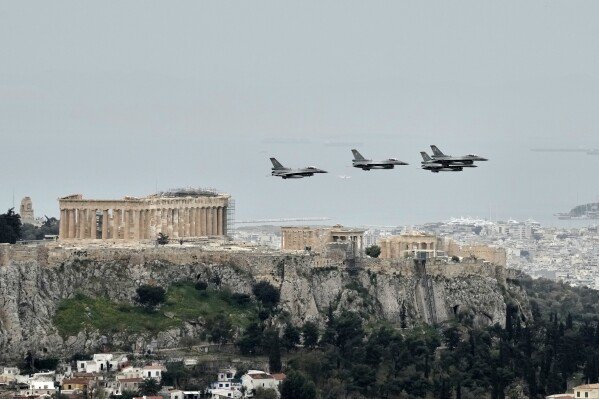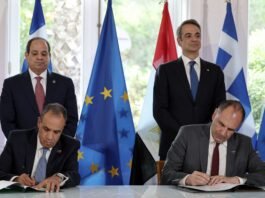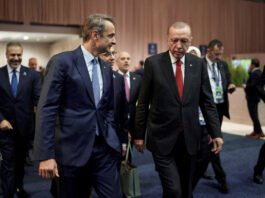Background on Greece’s Support for Ukraine
In the wake of Russia’s invasion of Ukraine in February 2022, numerous countries mobilized to provide support to the embattled nation. Greece, a nation with historical ties to Ukraine, was among the first to respond to the crisis by extending military assistance. This prompt reaction underscores Greece’s strategic commitment to safeguarding democratic values in the face of aggression, reflecting its historical empathy towards Ukraine, which has faced territorial and sovereignty threats.
The military assistance provided by Greece has encompassed various forms of arms and equipment. Notably, the Hellenic Armed Forces contributed light weaponry, ammunition, and anti-tank systems which were critical during the initial phases of the conflict. Furthermore, Greece also pledged humanitarian support, ensuring that Ukraine received not only military aid but also medical supplies and food provisions. Such multifaceted support has emphasized Greece’s proactive stance, distinguishing it among other European nations in terms of rapid military response.
This early commitment by Greece has significant implications for its current military capabilities, particularly concerning its fighter jet inventory. The ongoing conflict and increased demand for military resources have sparked discussions about the sustainability of Greece’s defense stockpile. The international pressures regarding the provision of fighter jets to Ukraine have placed Greece in a precarious situation, balancing its defense needs against the demands of solidarity with Ukraine. As discussions continue regarding potential fighter jet sales, this backdrop serves as a critical context for understanding Greece’s strategic military considerations and the delicate dynamics in play as it navigates support for Ukraine while maintaining its own national security.
External Pressures: The Role of International Entities
The current geopolitical landscape is significantly influenced by the actions and expectations of international entities. Among these, the United States plays a crucial role, particularly in regards to military maneuvers and support for Ukraine in its conflict with Russia. The pressure exerted by the U.S. often reverberates through Europe, compelling countries like Greece to reassess their defense strategies. The United States has positioned itself as a vital ally for Ukraine, leading to heightened expectations on NATO members to provide military assistance, thus creating a complex web of obligations and strategic considerations.
Furthermore, the European Union, alongside NATO, intensifies these pressures by advocating for a unified approach to defense within its member states. Greek officials find themselves balancing national defense needs with international expectations, particularly regarding the potential sale of military assets, such as the Mirage 2000-5 fighter jets. The characterization of these fighters as potential assets for intermediary countries has raised questions not only about Greece’s military readiness but also about its alignment with broader European security objectives. The expectation from NATO and the EU is that member states contribute to collective defense capabilities, hence emphasizing the crucial role Greece plays in this context.
The implications of such pressures are profound. Greece must navigate the delicate balance of maintaining its defense capabilities while simultaneously adhering to the demands from international partners. This balancing act extends to considerations about regional stability the necessity of support for Ukraine, and maintaining Greece’s strategic interests. In light of this, Greece’s defense strategy is under ongoing scrutiny, and any moves to sell military equipment are closely monitored by both allies and adversaries alike. This evolving scenario underscores the complexities involved in Greece’s military diplomacy and the broader implications for regional and global security dynamics.
Greece’s Reluctance and Strategic Calculations
Greece has approached the issue of providing advanced military systems to Ukraine with caution, reflecting a complex interplay of geopolitical considerations and national interests. The reluctance stems from an awareness of the potential repercussions that may arise from supplying arms that could be utilized against Russia, a nation with which Greece has maintained a nuanced relationship. This hesitance is not merely a reaction to current events; it is deeply rooted in historical ties and ongoing energy dependencies that shape Athens’ foreign policy decisions.
For decades, Greece has fostered significant energy ties with Russia, largely through the importation of natural gas. This relationship underscores the strategic importance of maintaining a level of diplomatic balance, especially as tensions escalate between Moscow and Western nations. The fear of jeopardizing these critical energy supplies plays a substantial role in Greece’s decision-making process regarding military aid to Ukraine. By providing advanced military capabilities, such as fighter jets, Greece could risk inciting retaliation from Russia, which may further complicate its energy security and economic stability.
Additionally, Greece has historically engaged in selling older military equipment rather than newer, sophisticated systems. For instance, the sale of surplus aircraft and naval assets has allowed the nation to modernize its armed forces without exacerbating regional tensions. This approach aligns with Greece’s objective of maintaining a robust defense posture while avoiding actions that could provoke Russia. In this context, the decision to refrain from supplying advanced fighters to Ukraine becomes a strategic calculation aimed at safeguarding national interests amid a rapidly evolving geopolitical landscape.
Future of Greece’s Air Force: Procurement and Sales
The future of Greece’s Air Force is closely tied to its military procurement plans, particularly in light of recent geopolitical tensions and technological advancements. One of the most significant aspects of these plans is the potential acquisition of F-35 fighter jets. The introduction of the F-35, renowned for its advanced stealth capabilities and versatility, would significantly enhance Greece’s air combat readiness. The transition to these state-of-the-art aircraft not only strengthens national defense but also demonstrates Greece’s commitment to modernizing its military in the face of emerging threats.
As Greece considers adding F-35s to its fleet, the existing Mirage 2000-5 aircraft will likely come under scrutiny. Discussions are underway regarding the potential sale of these older jets to intermediary nations. This move could free up resources and create a more streamlined air force structure. Moreover, the sale of Mirage 2000-5s could aid in bolstering military ties with allied nations while simultaneously providing financial support for transitioning to newer and more advanced aircraft.
Strategically, Greece’s military expansion aligns with the broader objective of enhancing its regional security posture. The acquisition of modern fighters such as the F-35 not only addresses immediate operational needs but also prepares the Air Force for future challenges, including shifts in alliances and increased tensions in the Mediterranean region. As Greece navigates its procurement strategies, careful consideration must be given to timing and operational integration to ensure a smooth transition from older aircraft to the latest technology. Furthermore, as Greece’s military capabilities evolve, so too will its role within NATO and its relationships with neighboring countries, reflecting a proactive stance in a rapidly changing geopolitical landscape.




